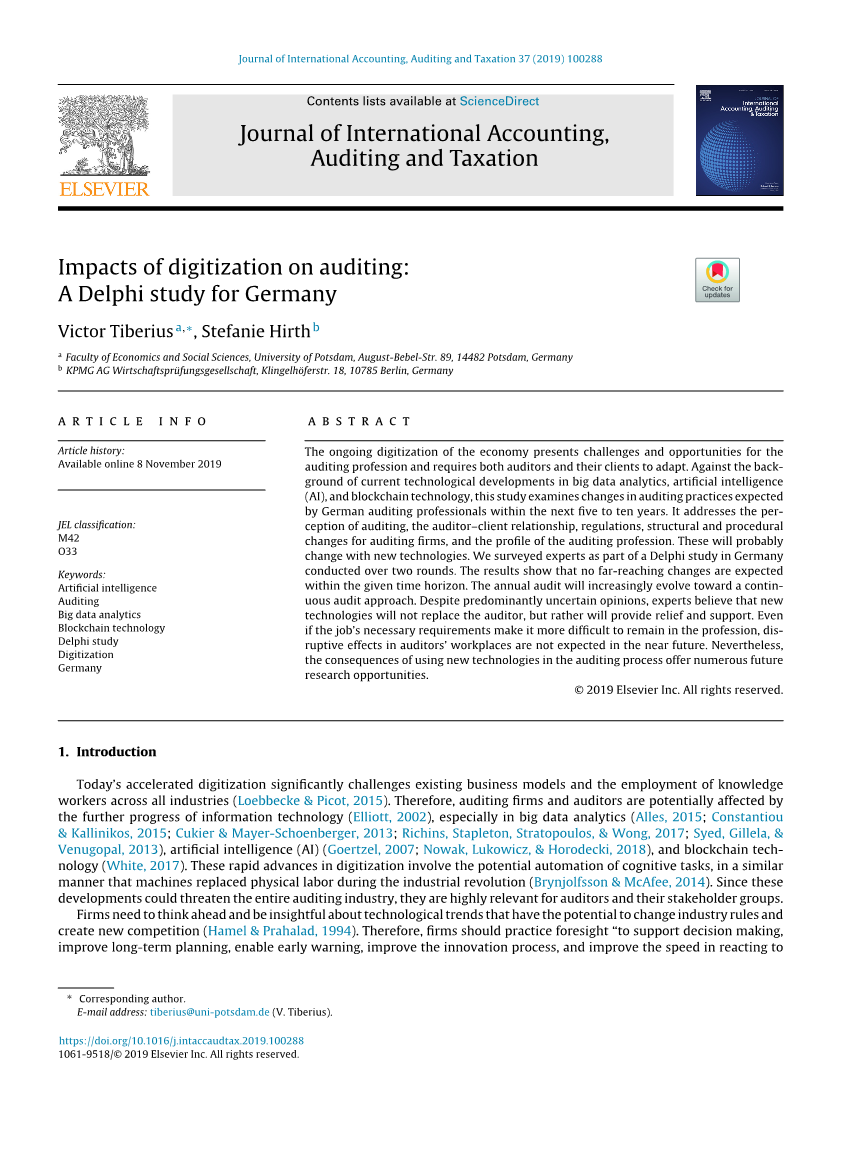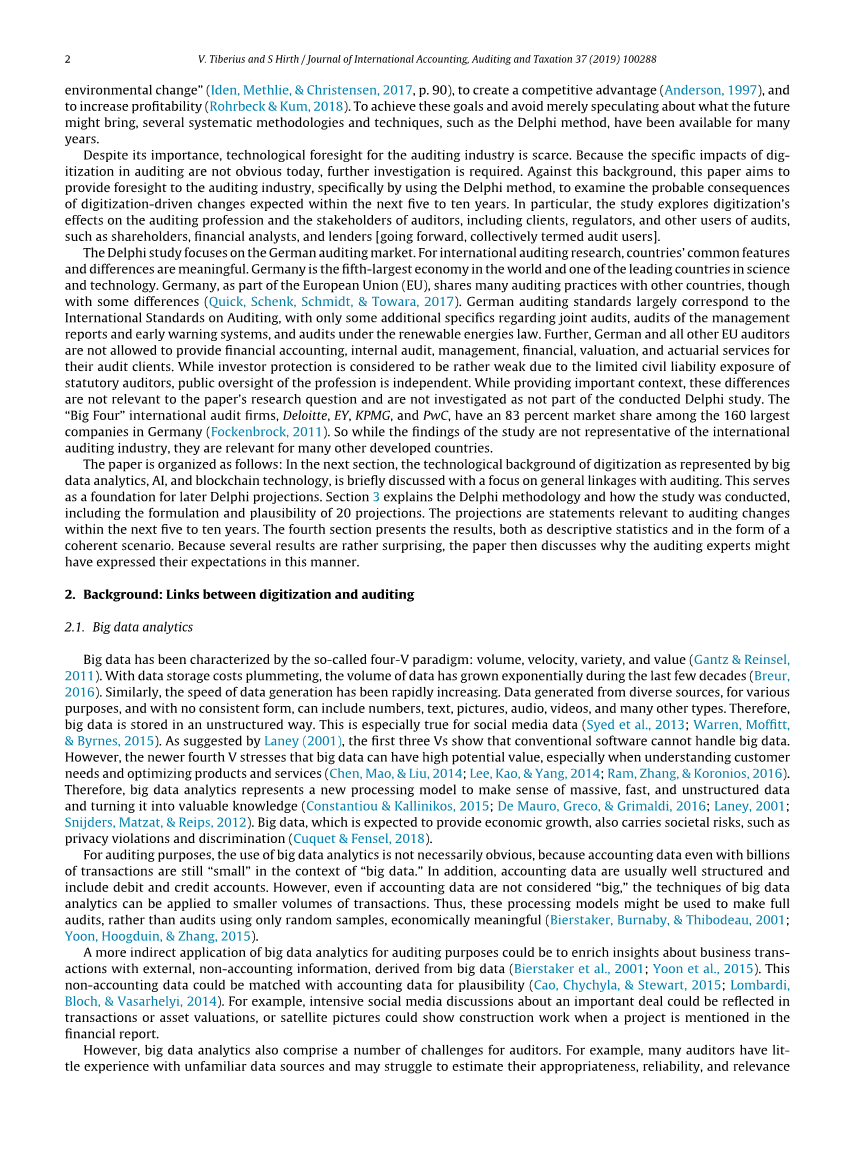

英语原文共 14 页,剩余内容已隐藏,支付完成后下载完整资料
武汉理工大学毕业论文 论大智移云背景下的审计技术方法创新 外文翻译 Impacts of digitization on auditing: A Delphi study for Germany Victor Tiberius ,Stefanie Hirth
Abstract
The ongoing digitization of the economy presents challenges and opportunities for the Auditing profession and requires both auditors and their clients to adapt. Against the back-ground of current technological developments in big data analytics, artificial intelligence (AI),and blockchain technology, this study examines changes in auditing practices expected by German auditing professionals within the next five to ten years. It addresses the perception of auditing, the auditor–client relationship, regulations, structural and procedural changes for auditing firms, and the profile of the auditing profession. These will probably change with new technologies. We surveyed experts as part of a Delphi study in Germany conducted over two rounds. The results show that no far-reaching changes are expected within the given time horizon. The annual audit will increasingly evolve toward a continuous audit approach. Despite predominantly uncertain opinions, experts believe that new technologies will not replace the auditor, but rather will provide relief and support. Even if the jobrsquo;s necessary requirements make it more difficult to remain in the profession, disruptive effects in auditorsrsquo; workplaces are not expected in the near future. Nevertheless,the consequences of using new technologies in the auditing process offer numerous future research opportunities.1、Introduction
Todayrsquo;s accelerated digitization significantly challenges existing business models and the employment of knowledge workers across all industries (Loebbecke amp; Picot, 2015). Therefore, auditing firms and auditors are potentially affected by the further progress of information technology (Elliott, 2002), especially in big data analytics (Alles, 2015; Constantiouamp; Kallinikos, 2015; Cukier amp;Mayer-Schoenberger, 2013; Richins, Stapleton, Stratopoulos, amp; Wong, 2017; Syed, Gillela, amp; Venugopal, 2013), artificial intelligence (AI) (Goertzel, 2007; Nowak, Lukowicz, amp; Horodecki, 2018), and blockchain technology (White, 2017). These rapid advances in digitization involve the potential automation of cognitive tasks, in a similar manner that machines replaced physical labor during the industrial revolution (Brynjolfsson amp; McAfee, 2014). Since these developments could threaten the entire auditing industry, they are highly relevant for auditors and their stakeholder groups.
Firms need to think ahead and be insightful about technological trends that have the potential to change industry rules and create new competition (Hamel amp; Prahalad, 1994). Therefore, firms should practice foresight “to support decision making, improve long-term planning, enable early warning, improve the innovation process, and improve the speed in reacting to environmental change” (Iden, Methlie, amp; Christensen, 2017, p. 90), to create a competitive advantage (Anderson, 1997), and to increase profitability (Rohrbeck amp; Kum, 2018). To achieve these goals and avoid merely speculating about what the future might bring, several systematic methodologies and techniques, such as the Delphi method, have been available for many years. Despite its importance, technological foresight for the auditing industry is scarce. Because the specific impacts of digitization in auditing are not obvious today, further investigation is required. Against this background, this paper aims to provide foresight to the auditing industry, specifically by using the Delphi method, to examine the probable consequences of digitization-driven changes expected within the next five to ten years. In particular, the study explores digitizationrsquo;s effects on the auditing profession and the stakeholders of auditors, including clients, regulators, and other users of audits,such as shareholders, financial analysts, and lenders [going forward, collectively termed audit users]. The Delphi study focuses on the German auditing market. For international auditing research, countriesrsquo; common features and differences are meaningful. Germany is the fifth-largest economy in the world and one of the leading countries in science and technology. Germany, as part of the European Union (EU), shares many auditing practices with other countries, though with some differences (Quick, Schenk, Schmidt, amp; Towara, 2017). German auditing standards largely correspond to the International Standards on Auditing, with only some additional specifics regarding joint audits, audits of the management reports and early warning systems, and audits under the renewable energies law. Further, German and all other EU auditors are not allowed to provide financial accounting, internal audit, management, financial, valuation, and actuarial services for their audit clients. While investor protection is considered to be rather weak due to the limited civil liability exposure of statutory auditors, public oversight of the profession is independent. While providing important context, these differences are not relevant to the paperrsquo;s research question and are not investigated as not part of the conducted Delphi study. The “Big Four” international audit firms, Deloitte, EY, KPMG, and PwC, have an 83 percent market share among the 160 largest companies in Germany (Fockenbrock, 2011). So while the findings of the study are not representative of the international auditing industry, they are relevant for many other developed countries. The paper is organized as follows: In the next section, the technological background of digitization as represented by big data analytics, AI, and blockchain technology, is briefly discussed with a focus on general 剩余内容已隐藏,支付完成后下载完整资料资料编号:[234221],资料为PDF文档或Word文档,PDF文档可免费转换为Word
您需要先支付 30元 才能查看全部内容!立即支付
课题毕业论文、开题报告、任务书、外文翻译、程序设计、图纸设计等资料可联系客服协助查找。
您可能感兴趣的文章
- 饮用水微生物群:一个全面的时空研究,以监测巴黎供水系统的水质外文翻译资料
- 步进电机控制和摩擦模型对复杂机械系统精确定位的影响外文翻译资料
- 具有温湿度控制的开式阴极PEM燃料电池性能的提升外文翻译资料
- 警报定时系统对驾驶员行为的影响:调查驾驶员信任的差异以及根据警报定时对警报的响应外文翻译资料
- 门禁系统的零知识认证解决方案外文翻译资料
- 车辆废气及室外环境中悬浮微粒中有机磷的含量—-个案研究外文翻译资料
- ZigBee协议对城市风力涡轮机的无线监控: 支持应用软件和传感器模块外文翻译资料
- ZigBee系统在医疗保健中提供位置信息和传感器数据传输的方案外文翻译资料
- 基于PLC的模糊控制器在污水处理系统中的应用外文翻译资料
- 光伏并联最大功率点跟踪系统独立应用程序外文翻译资料



